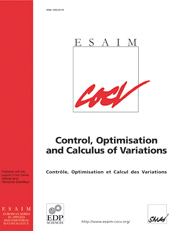Crossref Citations
This article has been cited by the following publications. This list is generated based on data provided by Crossref.
Capdeboscq, Yves
and
Vogelius, Michael S.
2003.
A general representation formula for boundary voltage perturbations caused by internal conductivity inhomogeneities of low volume fraction.
ESAIM: Mathematical Modelling and Numerical Analysis,
Vol. 37,
Issue. 1,
p.
159.
Ammari, Habib
and
Khelifi, Abdessatar
2003.
Electromagnetic scattering by small dielectric inhomogeneities.
Journal de Mathématiques Pures et Appliquées,
Vol. 82,
Issue. 7,
p.
749.
Bal, Guillaume
2003.
Optical tomography for small volume absorbing inclusions.
Inverse Problems,
Vol. 19,
Issue. 2,
p.
371.
Ammari, Habib
and
Volkov, Darko
2003.
Correction of order three for the expansion of two dimensional electromagnetic fields perturbed by the presence of inhomogeneities of small diameter.
Journal of Computational Physics,
Vol. 189,
Issue. 2,
p.
371.
Volkov, Darko
2003.
Numerical methods for locating small dielectric inhomogeneities.
Wave Motion,
Vol. 38,
Issue. 3,
p.
189.
Ammari, Habib
Iakovleva, Ekaterina
and
Moskow, Shari
2003.
Recovery of Small Inhomogeneities from the Scattering Amplitude at a Fixed Frequency.
SIAM Journal on Mathematical Analysis,
Vol. 34,
Issue. 4,
p.
882.
Capdeboscq, Yves
and
Vogelius, Michael S.
2003.
Optimal asymptotic estimates for the volume of internal inhomogeneities in terms of multiple boundary measurements.
ESAIM: Mathematical Modelling and Numerical Analysis,
Vol. 37,
Issue. 2,
p.
227.
Ammari, Habib
and
Kang, Hyeonbae
2003.
High-Order Terms in the Asymptotic Expansions of the Steady-State Voltage Potentials in the Presence of Conductivity Inhomogeneities of Small Diameter.
SIAM Journal on Mathematical Analysis,
Vol. 34,
Issue. 5,
p.
1152.
Kang, Hyeonbae
Kim, Eunjoo
and
Lee, June-Yub
2003.
Identification of elastic inclusions and elastic moment tensors by boundary measurements.
Inverse Problems,
Vol. 19,
Issue. 3,
p.
703.
Kang, Hyeonbae
and
Lee, Hyundae
2004.
Identification of simple poles via boundary measurements and an application of EIT.
Inverse Problems,
Vol. 20,
Issue. 6,
p.
1853.
Ammari, Habib
Kwon, Ohin
Seo, Jin Keun
and
Woo, Eung Je
2004.
T-Scan Electrical Impedance Imaging System for Anomaly Detection.
SIAM Journal on Applied Mathematics,
Vol. 65,
Issue. 1,
p.
252.
Marin, L.
Elliott, L.
Ingham, D.B.
and
Lesnic, D.
2004.
The boundary element method for the numerical recovery of a circular inhomogeneity in an elliptic equation.
Engineering Analysis with Boundary Elements,
Vol. 28,
Issue. 4,
p.
413.
Ben Hassen, M. F.
and
Bonnetier, E.
2005.
Asymptotic Formulas for the Voltage Potential in a Composite Medium Containing Close or Touching Disks of Small Diameter.
Multiscale Modeling & Simulation,
Vol. 4,
Issue. 1,
p.
250.
Ammari, Habib
Asch, Mark
and
Kang, Hyeonbae
2005.
Boundary voltage perturbations caused by small conductivity inhomogeneities nearly touching the boundary.
Advances in Applied Mathematics,
Vol. 35,
Issue. 4,
p.
368.
Ammari, Habib
Kang, Hyeonbae
Kim, Eunjoo
and
Lim, Mikyoung
2005.
Reconstruction of Closely Spaced Small Inclusions.
SIAM Journal on Numerical Analysis,
Vol. 42,
Issue. 6,
p.
2408.
BEN ABDA, AMEL
DELBARY, FABRICE
and
HADDAR, HOUSSEM
2005.
ON THE USE OF THE RECIPROCITY-GAP FUNCTIONAL IN INVERSE SCATTERING FROM PLANAR CRACKS.
Mathematical Models and Methods in Applied Sciences,
Vol. 15,
Issue. 10,
p.
1553.
Ammari, Habib
Iakovleva, Ekaterina
and
Lesselier, Dominique
2005.
Two Numerical Methods for Recovering Small Inclusions from the Scattering Amplitude at a Fixed Frequency.
SIAM Journal on Scientific Computing,
Vol. 27,
Issue. 1,
p.
130.
Baratchart, L
Abda, A Ben
Hassen, F Ben
and
Leblond, J
2005.
Recovery of pointwise sources or small inclusions in 2D domains and rational approximation.
Inverse Problems,
Vol. 21,
Issue. 1,
p.
51.
Bal, Guillaume
and
Pinaud, Olivier
2005.
Time-reversal-based detection in random media.
Inverse Problems,
Vol. 21,
Issue. 5,
p.
1593.
Guzina, Bojan B
and
Bonnet, Marc
2006.
Small-inclusion asymptotic of misfit functionals for inverse problems in acoustics.
Inverse Problems,
Vol. 22,
Issue. 5,
p.
1761.


